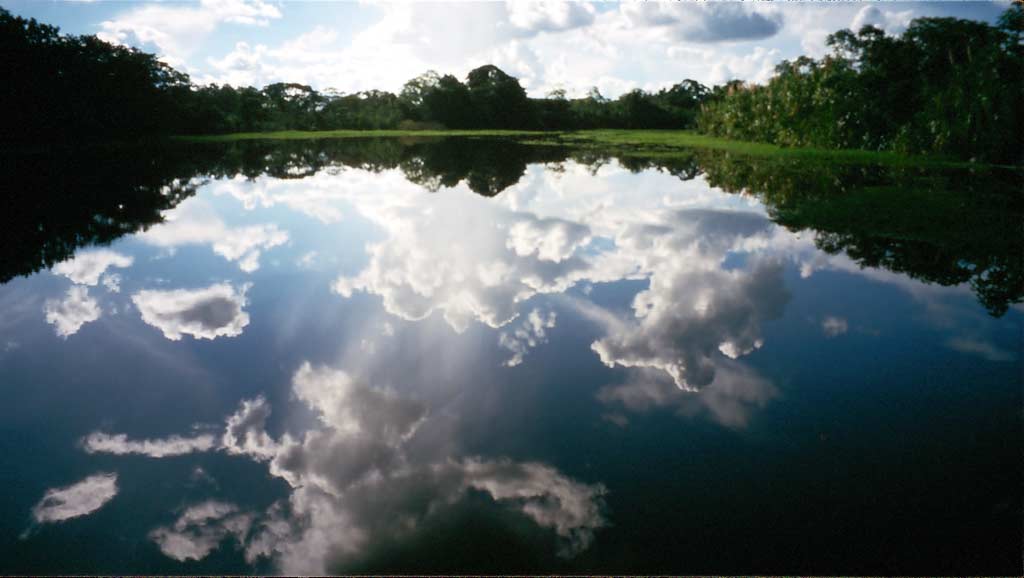
Travelogue Bolivia 2003
Downstream Mamoré
March 6th, 2003
Dear Friends,
I have been travelling the Amazon! And if one of you feels like correcting me, telling me that the river I sailed was the Mamoré, not the Amazon, then I reply: The water I travelled on, the water I used to wash myself, the water the fish I ate lived in, the water used to cook my food, the water I drank (boiled as tea with a lot of sugar to cover the river taste), the water I peed in and one other thing I can’t remember right now, this water will soon enter the Amazon, cross the continent through this largest of all rivers and finally reach the Atlantic. My water! Hah! I touched it! And drank it! And another thing … Whoever tells me how long this water takes to reach the sea will be mentioned in the next report. That’s a generous offer isn’t it? So try your best! 😉
But first there are other things to write about. Warning, this report contains opinions about different subjects, please don’t be irritated. If you don’t like it, wait for the next hopefully opinion-free report.
Potosi – Trinidad
Sunday and Monday I spent in Potosi, where I felt a bit ill. Maybe it was a bit of a cold (they sell Echinacea here, though the pharmacist tries to convince you that the chemical stuff is better), maybe it was the polluted air, the owner of the hotel I slept in told me, that he always has headaches whilst in the city. So I took a night bus and some 14 hours later I reached Cochabamba and was the first time in a while under 3000m. With Eric whom I had met on the bus I took a room in a very beautiful hotel and I spent the day finding out what I wanted to do. We considered going to the Torotoro national park with huge caves and Dino tracks but finally choose not to go as Eric was only interested in seeing the caves and alone I couldn’t afford the trip and it had cost me a whole week. So I bought my flight ticket to Trinidad and went the next day. We didn’t see anything of Cochabamba’s nice surroundings and its sights, didn’t feel very well in this town, but this may have been the aftermath of a night in the bus.
Adventure for being a Gringo
My adventure started a bit earlier and more negative than I had wished. I took a taxi from the airport, a five minute trip. As always I asked for the price first and I am sure that the driver said five Bolivianos. Arriving at the hotel he wanted fifteen, a number that sounds quite different in Spanish. When I told him I wouldn’t pay he gripped my jacket, tore it a little bit and also ripped of a belt of my backpack. He even wanted to enter a fist fight but then fortunately left after a discussion with the hotel owner.
As I learned later 15 would have been the right price for going alone, five the price for a colectivo, a shared taxi, normally my preferred choice. If he intentionally told me a wrong price to make me enter or if one of us made a mistake can’t be determined and the price difference is (for us) ridiculous. But using violence and damaging my stuff (much more expansive than the 10 Bolivianos = 1.50 Dollar difference) was reason enough to report the incident to the tourist office.
There they were very helpful and friendly, took the incident much more seriously than I had wanted. All I wanted was that they noted what happened in case that something similar with the same driver happened again. But they seem to have rules what to do and are very concerned that nothing negative happens to any tourist as they fear to loose the little tourism they have, loose the money the tourists spend. First they even wanted to hand the case to the police, and I tried my best to stop them. Luckily also a confrontation with the driver and a forced excuse did not happen. All in all it was an interesting experience. And though this sounds strange I had some funny hours discussing with the ladies of the tourist office whom of them I would choose to join me on my river trip. I had planed to visit the harbour to get information about leaving boats, but they didn’t let me. But they called the Port Captain for me and found me a ship.
3rd world countries – part 2
I will continue my excurse of the Salta report. As I told you Bolivia is much poorer than Argentina even now as Argentina is in a crisis. Argentina made it, is not a third world country anymore. For Bolivia the situation is different, it is dependent on money from the IMF which dictates huge parts of the countries politics. The country is missing all kind of structures, good education, working government. hough Bolivia is a rich country considering it has minerals, ore, natural gas and even some mineral oil. One of the things the country really would need is a connection to the sea to sell these goods, but the surrounding countries (Peru, Brazil and the not so loved Chile) cash for the transit of these things, cash so much that there isn’t anything left as the prices on the world market are very low. If I understood correctly Bolivia had a connection to the sea some hundred years ago but lost it in a war against Chile. The president now tries to build a pipeline through Chile, possibly considering only the interests of the huge company he owns.
Travelling and speaking with the people (you of course do speak about the war as everybody in the world does. I haven’t found a single person in favour of this war. Anybody of you perhaps? I really would be interested in the arguments …) I naturally also spoke about the country’s economical situation. Around Potosi the people are very poor, quite a few suffer from hunger, ask for a piece of bred in the streets. They told me that there is quite a lot of money reaching the county but never reaching the poor as it vanishes in a system of corruption. There is a saying that money for third world countries always goes from the poor in the rich countries to the rich in the poor countries. Very sad.
But back to the things that happened to me. The evening after the taxi incident I went for dinner, ordering a steak and the serving was so huge that nobody could possible finish it. So I made two sandwiches from the rolls and the rest of the meet and went to the park where I had seen two “shoeshine-mister” boys. When I found them there was a bunch of them, not only two, and I had not presented my sandwiches yet when they had vanished from my hands and a fight started over each bite of it. As always the most little ones, the ones I wanted to give the sandwiches to, did not get anything 🙁 I went into a shop, bought some bred and a few apples, went back and gave it to the boys. Unfortunately once again it was only the big ones that got something as the little boys had gone back to look for some shoes to shine. You really feel good doing something like this. Claim: There are only egoistic people, who helps others is a altruistic egoist who helps because that makes him / her feel better. But even if the motif partly consists of vanity, arrogance and you help because you want to prove what a hell of good person you are that doesn’t change the fact that someone had something to eat and hopefully slept a little better.
But what is reality in this country? My cabdriver the next morning saw things a little different. He told me that quite a lot of the international money reached the people and that they had turned lazy, preferring to eat sponsored food to working and earning the money themselves. And the reason for the kids from the park suffering where their fathers spending all their wages on beer rather than food for the family, something that seems to hold true for lots of the miners of Potosi, too. But this here was not Potosi, it was Trinidad surrounded by fertile jungle. According to the taxi driver the rivers are full of fish, the forest full of deer and the land could easily be cultivated and everyone could produce the necessary food him/herself. Workers were looked for but not found as nobody wanted to work. Is this true? Is it just an unrepresentative opinion? Is it the people’s mentality? Or missing education? One thing I myself saw a few times where older boys or girls sending their younger brothers or sisters in restaurants to sell stuff or ask for money, hoping to earn more the younger the kid is. So the youngest have to earn the money instead of playing, sleeping or learning and someday not being able to do something better than supervising the following generation on their tour through the restaurants.
How to help develop third world countries is definitely a difficult question and when you give money have a close look to whom and how the money is spent. So, that’s enough, I plead guilty of abusing you as a public diary and getting my thoughts to e-paper.
Adventure with Gringo bonus
The women of the tourist office had given me the information that the next day, Thursday, the Doris Sarita would leave the harbour, sometime in the early morning. The evening I called the Port Captain and they said the boat would not leave before afternoon. Anyway I got up early and called again, yes, in the afternoon, but they would ask the captain for me. I had breakfast and called again: The engine was running and they were only waiting for me. Stress, taxi (talked about the sandwich-incident), to the ship – everything calm, no engines running, still handling the cargo.
The ship actually were four ships, the main one with cabins and the motor (a Volvo diesel), this one was the Doris Sarita. In the front, being pushed the Claudia Patricia carrying cargo only, same for the Jobito on the left hand side and finally on the right the Ruben Dario carrying cargo and the passengers. Most of the cargo where gas bottles, two trucks, a few tons of food and beverages and later, only doing parts of the trip a few pigs, chickens and other stuff. All together it must have been some 150 tons including the ships themselves.
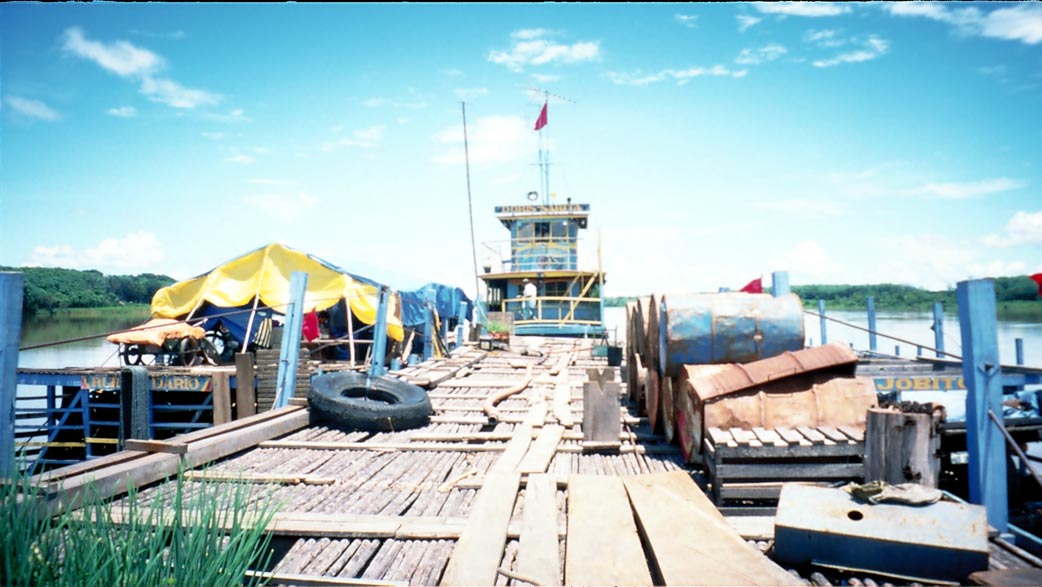
I wasn’t the only passenger but the only Gringo, the only one considering this a fun trip. The others were mainly people moving from one town to another accompanied by all their belongings and also the owner of all the food was on the boat. The passengers lived on a plain wood deck forming a second floor on the Ruben Dario where they had to spend the entire journey. The “room” was open to all sides and only covered by a plastic roof to protect against rain.
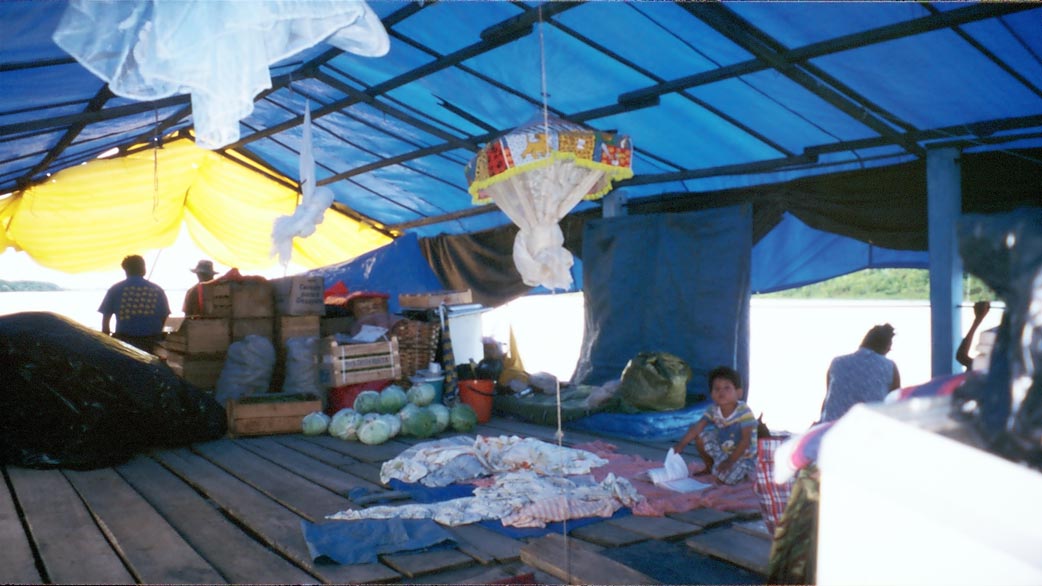
Speaking about rain: I left the rain free zone, around Potosi I even had the impression that rainy season finally began. But even if it does rain hard every second day that is nothing compared to a normal rainy season. As it often rains during the night only my trip is hardly affected.
They told me that the trip would not only last three or four days but a whole week as the captain Edwing Dorado Becerra does not like to sail through the nights. They told me that they would leave in one hour and I hurried back to town to inform my family about the name of the ship and the duration of the trip. Back to the harbour, this time using a motorbike taxi, that’s nice and cheap, bought some additional water and an emergency ration of cookies and went back to the ship. The hour passed, more and more cargo was taken aboard and whenever I asked they told me that we would leave in some two or three hours. It finally got five o’clock before I was told to register with the port captain and we finally left.
The first hours of the trip maybe were the most beautiful. I was sitting in the bow (Gringo bonus 1, I was free to go wherever I wanted, I was even allowed in the cabin where only captain and pilots stayed), the jungle passed by to my left and right, I saw birds, birds, birds, colourful or huge, birds of prey, parrots … who knows all the names? This was exactly what I had hoped for.

Gringo bonus 2: I also ate in the cabin together with captain and first pilot. One week I had excellent food, three meals a day included in the price, only 200 Bolvianos, some 25 Dollars.
Then the near fiasco. Dusk started and all passengers had prepared there beds, i.e. some blankets on the floor covered by a mosquito net. I never had spent more than a few hours in a hammock, never using a mosquito net which is a difficult combination, especially if you don’t know how to do it. I had not finished the construction yet, it looked quite nice, when the ship was taken to the shore. Shore, jungle — mosquitoes! Not one, not two, not even a hundred, I guess it were some 100 each cubic meter. Fuck! And I don’t use that word often. Even though I used clamps to close the mosquito net around the hammock there remained lots of holes and here you are glad if there are only a dozen mosquitoes inside the net. There are so many that each hole in your clothes or repellent will be found, there are always a few mutant mosquitoes who don’t care that you used a DEET repellent or a few strong enough to sting through your No-sting-said-the-salesman-trousers. The spirals you burn and are said to work even outside rooms? No effect at all. It was no later than half past seven. I spent a few minutes in the hammock and filled up with panic (how can I leave this boat? Get back? Find a faster boat that doesn’t stop at night?). Then I fled to the cabin and was allowed in. There were some Mexican soaps on TV, the transmission was bad and it looked more like a war between black ants and white ants than like a lousy TV show. A few hours later Gringo bonus 3: I was allowed to sleep inside.
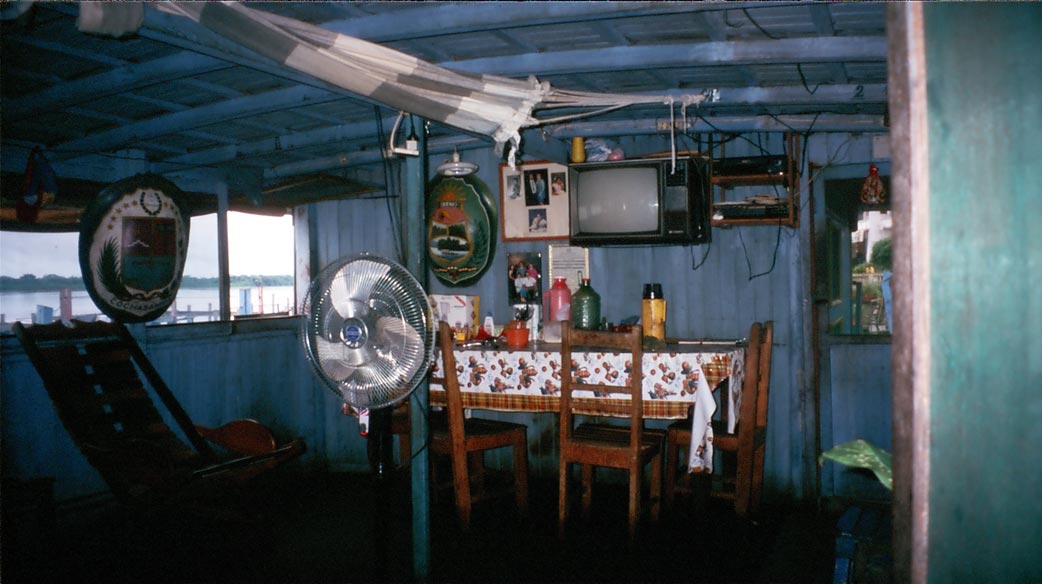
It is neither necessary nor possible to describe the following days in detail. The river got wider and wider which took a lot of the atmosphere, it got much more difficult to watch animals. Nevertheless it was a great trip, lots of parrots, which are just normal birds here, always going in pairs or bigger groups, making a lot of noise. Lay back and enjoy. Lots of other kinds of birds and no alligators to be seen though there must be a lot. They are difficult to spot, hide themselves and wait for a stupid tourist to swim by.
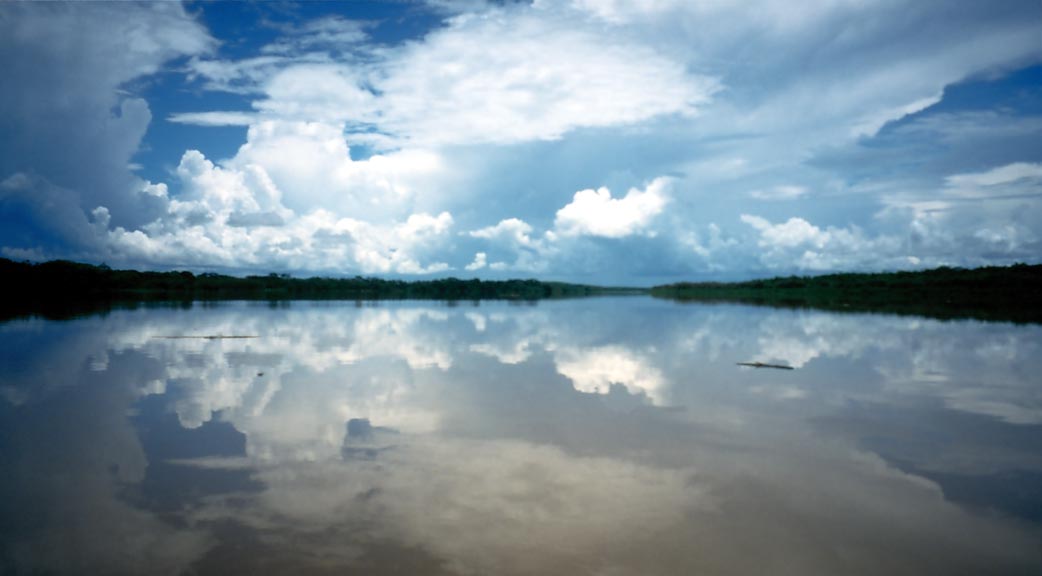
From the second night on there was no TV anymore, but each day two video movies, almost exclusively action, Rocky IV + V, Collateral Damage, Spiderman, Kiss of the dragon, First Knight. They stopped Signs as there was no action at all. All these movies were illegal copies sold here in the streets and though I work in the movie license trading business I consider this as a fair answer to the damage that American imperialism has done and still does in Latin America. It was a bit sad, that during daytime there was the sound of the engine and during night the sound of the generator so that I could never enjoy the unspoiled sound of the jungle. But at the bow of the boat, where I sat a lot watching the waves roll by, it was almost silent, there was nothing but I and nature.
There were times when I felt quite insecure. A ship is a strange place I am not used to, there are hierarchies you don’t know, rules you don’t know and yet you depend on ship and crew. It is a little hard as here in Bolivia there is once again the cultural barrier, it is not so easy to get to know the people. The stuff I carry is for these people worth a year’s earning or possible more, the question asked most often is how much is this or that. I got to feel their jealousy. But is it fair to enter these peoples’ life, to show them our standard of living, make them discontent with the things they have? Now I have to say that everybody was more than nice to me, especially the captain, who cared for me like a father. He didn’t want to accept a higher price that I offered for the advantages he gave me, but accepted a 100% tip for the crew and promised to buy them a big dinner.
Each day we sailed between 100 and 230 km, depending how often we stopped to exchange part of the cargo. The village we stopped in the middle of the trip for the food-salesman to leave the ship with all his vegetables and beer to sell them in another village even further down the jungle was the first place I ever been where there was no Coca Cola. Incredible that someplace like this still exists. How nice! How bad for me because I was dying for a cold coke but the local chemical lemonade was quite nice, too, and even cooled!!!
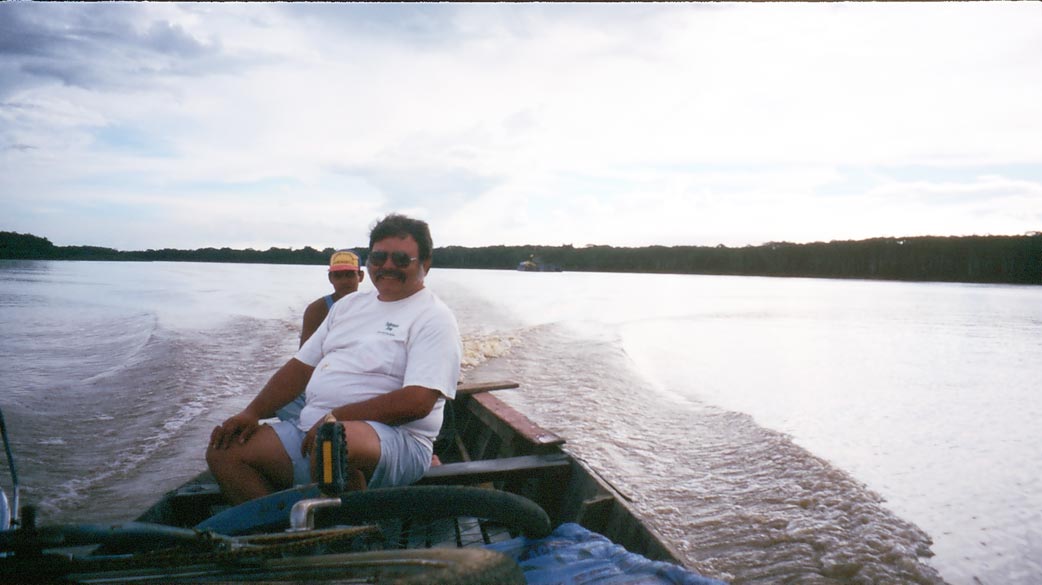
It is a funny experience asking someone on one of these ships for the waste basket, because nobody does understand why you shouldn’t simply throw the stuff out of the window into the water. It is my opinion that throwing stuff like plastic, paper, glass or cans out of the window is only an aesthetic problem, because I don’t believe it harms nature and I never saw a plant or animal that minded one or a hundred plastic bags on the ground. Some water animal will love to live in a plastic bottle cave with 360 degree panorama and in a few hundred or thousand years there won’t be anything left. But it gives you an impression of the size of this river knowing that nobody cares to drop their waste and though there is nothing to see.
And then I got to know another strange feeling, a feeling that I didn’t know and that Priti, who spend weeks in the jungle, had told me about. There weren’t any mirrors on the ship and I didn’t see my own face for a week. Normally our face is almost the first thing we see in the morning when brushing our teeth and in the evenings the last. It was quite funny. I felt the beard growing, wondering how long it had become, asking myself, whether I had some dirt or big spot in the face everybody was staring at and wondering what I looked like.
By the way: On the river everybody has constantly been tired though doing nothing. This is quite nice as the time passes less slowly. For staying awake the crew is chewing coca all day long that the captain distributes each evening from a big box. They even say that it prevents all kinds of sickness. Just an excuse or truth?
It was a nice and very interesting trip, you get to know a different kind of life, a life strange to us and normal to the people here, you get an impression of the size of the country and the jungle you pass each day. The river got so wide that it still would interest me seeing the Amazon that must be so wide that you sometimes can not even see the shore, but I wouldn’t be interested anymore to travel on it for some days, I would only love to sail some of the small upper arms of the river. I am not sure whether I had done this trip if I had known what me expected. Six days were too long though this has some advantages as I mentioned above.
Here some hints if anyone of you wants to do a similar trip: Check in advance how long the trip is going to be, double check every info you get. Check where and how you can sleep and spend your time. Don’t simple expect to be as lucky as I was, in the fifth night I couldn’t sleep in the hammock anymore as my back was hurting horrible and they even organized me a bed. Heaven! Take enough water. Take fruits, but only those kinds suitable for storage and transport. My water melon was a nice desert for the whole ship. Be prepared for diarrhoea and take antibiotics in case that you get a stomach infection. Knock on wood; I had never expected that my stomach would do it without any problems. Take cookies and some safe food you can eat if you should get ill. Mosquito protection: It was hot, but I preferred to wear long thick clothes all day long, boots, mosquito safe trousers, safe shirt, repellent on hands and head and my favourite head mosquito net I only wear in evenings and during the night. A normal big mosquito net is a must. The mosquitoes here attack without the annoying sound I am used to from home which is positive as you can’t avoid them anyway. But their bites are itchy, my god! Malaria prophylactics and / or standby medication are also extremely important.
Wednesday morning we arrived after some 820 km, it was strange to leave the ship after one week. But I did look forward to having a nice shower! I took another motor bike taxi in Guayaramerín, then a colectivo for one and a half hours and now I am in Riberalta, the only town of some size (65.000 inhabitants) in a huge area and far from any tourist center.
In the hotel I met Frederick, a Bolivian with Swiss grand parents. He told me about a nice lake nearby, organized me a scooter and we spend a relaxed day in the area. We went swimming visited some jungle like forest and I got eaten by some more mosquitoes. And I met a German lady that hopefully will help me as I hardly have any money left and she will give me some dollars against an online transaction to her account. There is internet in this place but no cash machine, so this is a nice possibility. Tomorrow I will enter another bus and after long hours reach Rurrenabarque in one of the biggest national parks of the world. Unfortunately I will arrive in the middle of the night but I don’t have a choice.
Greetings from Riberalta, Bolivia
Volker